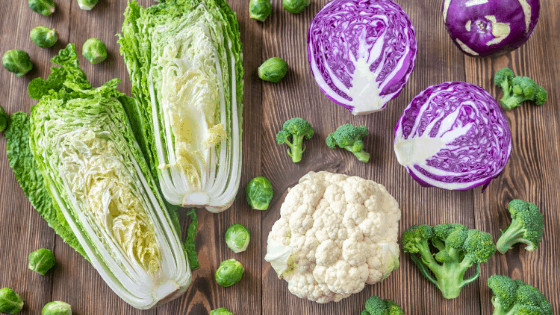
22 Apr Cruciferous Vegetables
These vegetables are some of my favorite vegetables to eat! They are powerful in nutrients, antioxidants, phytochemicals to help prevent disease & nourish your cells for that optimal communication you are looking for in your body. Before we get into these vegetables, you want some truth? Some of these vegetables I was NOT a fan of. I really had to try and cook them different ways to find out what worked for me. So even though I’m a nutritionist, I am human and I totally get if you are sticking out your tongue as I talk about a vegetable that you may not be a fan of. I get it. I was there. It’s all about finding what tastes great to you and incorporating these babies into your diet…somehow…someway.
What Are Cruciferous Vegetables?
These vegetables that I’m talking about are broccoli, cauliflower, kale, brussel sprouts, cabbage, bok choy, turnips, arugula, and more! The ones I listed are the most popular that you could easily find in a store. They are all under the cruciferous vegetables category because they are in the same family. How cool is that? The history of why they are named cruciferous vegetables comes from the natural four leaf formation of the plant that looks like a cross/crucifix shape. What a perfect group of vegetables to write about as Easter season nears this weekend.
What Are The Nutrients & Phytochemicals Cruciferous Vegetables?
Cruciferous vegetables are high in vitamin A, vitamin C, folate, fiber, vitamin K, phosphorus, and potassium. These vegetables also include the B vitamins, magnesium, zinc, iron, and more. Vitamin A and C are essential for the immune system, along with more health benefits. Folate is needed for formation of red & white blood cells and production of DNA/RNA. Vitamin K is essential for building strong bones/preventing tooth decay, prevents heart disease, and enhances brain health. What I list about these nutrients and what they can do is only the tip of the iceberg. They do SO much more.
Phytochemicals are chemicals inside these vegetables that are responsible for the color, smell, and health benefit (or danger) of a plant. These phytochemicals are amazing at what it does for the body. In cruciferous vegetables specifically, one of the major phytochemicals is glucosinolates. This is a class of sulphur-containing glycosides and they breakdown into components like isothiocyanates, indoles, nitriles, and thiocynates, crambene.
Cruciferous Vegetables & Cancer
The isothiocyanates that I mentioned above are linked to the strong effect it has against cancers. The Physician’s Committee for Responsible Medicine states,
“Isothiocyanates stop cancer dead in their tracks in three different ways: 1) They don’t allow carcinogens to be activated. 2) They counteract the poisonous effects of carcinogens that have been activated and 3) they speed up their removal from the body.”
Pretty amazing huh? It doesn’t stop there. Glucosinolates/isothiocyanates induce apoptosis (cell death) of human tumor cells. You can read a study here done by the International Journal of Vitamin and Nutrition Research. A study done in the Lancet also showed how isothiochynates reduced the risk of lung cancer. A placebo study done in the Gynecologic Oncology Journal showed that women with precancerous lesions on the cervix had a significant regression of CIN (Cervical Intra-epithelial Neoplasia) with a supplement called I-3-C (which is indole 3 carbinol).
Another study that was done in the Journal of Nutrition showed the synergy among the phytochemicals found in cruciferous vegetables. These phytochemicals worked together to help detoxify the body naturally. Cruciferous vegetables are packed with antioxidants as well. This helps fight the free radicals in the body that can cause whole-body inflammation and can lead to cancer.
Doesn’t this make you want to go cook some broccoli or cauliflower up? To enhance the absorption of the fat-soluble vitamins (A, D, E, K) make sure that you cook these vegetables in good quality fats like coconut oil, avocado oil, grass-fed butter, or olive oil. Start taking back your health today with the cruciferous family!
In health,
Lahana Vigliano


